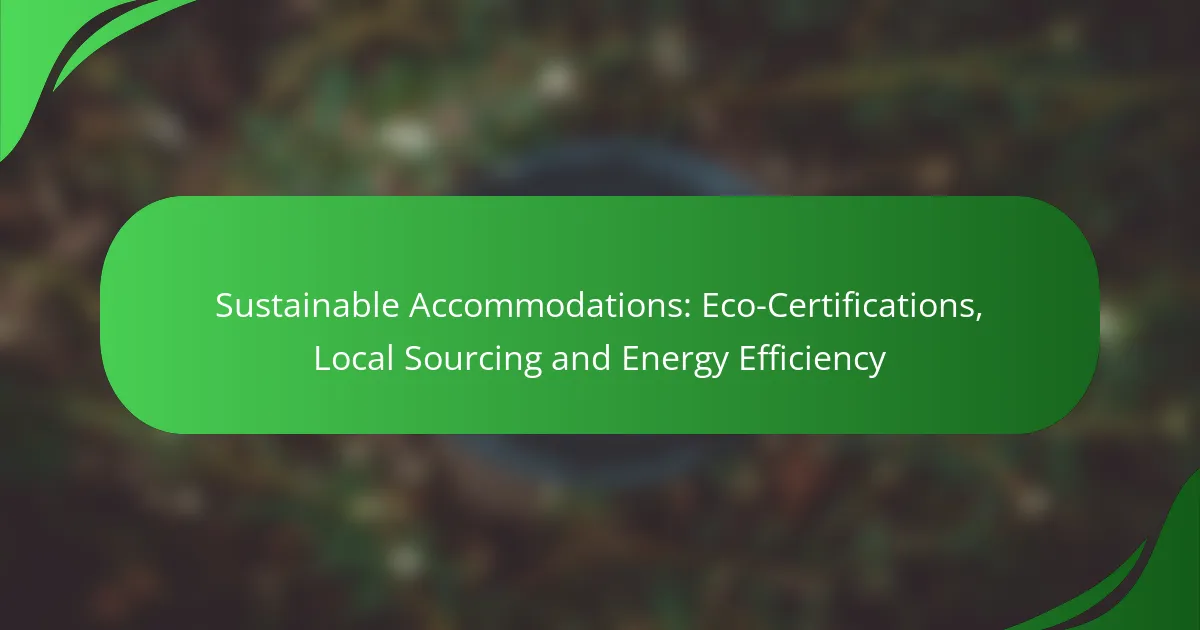Sustainable accommodations are designed to reduce environmental impact while enhancing social and economic benefits. By incorporating eco-certifications, local sourcing, and energy-efficient practices, these lodgings offer travelers a responsible and eco-friendly hospitality experience.

What are sustainable accommodations?
Sustainable accommodations are lodging options designed to minimize environmental impact while promoting social and economic benefits. These establishments often incorporate eco-certifications, local sourcing, and energy-efficient practices to create a more responsible hospitality experience.
Definition of sustainable accommodations
Sustainable accommodations refer to hotels, hostels, and other lodging types that prioritize eco-friendly practices. This includes using renewable energy sources, implementing waste reduction strategies, and supporting local communities through sourcing and employment.
Examples of sustainable accommodations include eco-lodges that utilize solar panels, hotels that practice water conservation, and establishments that offer locally sourced food. These practices not only reduce the carbon footprint but also enhance the guest experience by connecting them with the local environment.
Importance of sustainability in hospitality
Sustainability in hospitality is crucial for addressing the growing concerns about climate change and resource depletion. By adopting sustainable practices, accommodations can significantly reduce their environmental impact while appealing to an increasingly eco-conscious traveler demographic.
Incorporating sustainability can lead to cost savings through energy efficiency and waste reduction. For instance, hotels that invest in energy-efficient appliances may see a reduction in utility costs by a significant percentage over time. Furthermore, guests are often willing to pay a premium for eco-friendly options, enhancing revenue potential.

How do eco-certifications impact accommodations?
Eco-certifications significantly influence accommodations by establishing standards for sustainability practices. These certifications help travelers identify hotels and lodgings that prioritize environmental responsibility, promoting energy efficiency, waste reduction, and local sourcing.
Types of eco-certifications
Various eco-certifications exist, each with specific criteria and focus areas. Notable examples include LEED (Leadership in Energy and Environmental Design), Green Key, and EarthCheck. These certifications assess factors such as energy use, water conservation, and the use of sustainable materials.
Accommodations may also pursue local certifications that reflect regional sustainability goals, such as the Green Globe certification, which is recognized in many countries. Each certification has its own application process and renewal requirements, which can vary significantly.
Benefits of eco-certifications for hotels
Eco-certifications offer numerous advantages for hotels, including enhanced marketability and customer loyalty. Certified accommodations often attract environmentally conscious travelers who prefer to support sustainable businesses, potentially leading to increased bookings.
Additionally, hotels that implement eco-friendly practices can reduce operational costs through energy savings and waste management efficiencies. These practices not only benefit the environment but can also improve the overall guest experience, as many travelers appreciate the commitment to sustainability.

What are the best eco-certifications for hotels in the US?
The best eco-certifications for hotels in the US include LEED certification and the Green Key Eco-Rating. These certifications help travelers identify accommodations that prioritize sustainability through energy efficiency, waste reduction, and responsible sourcing.
LEED certification
LEED, or Leadership in Energy and Environmental Design, is a globally recognized certification system for green buildings. Hotels can earn points in various categories, such as energy use, water efficiency, and sustainable site development, to achieve different levels of certification (Certified, Silver, Gold, or Platinum).
To qualify for LEED certification, hotels must implement specific practices like using energy-efficient lighting, optimizing water usage, and sourcing materials sustainably. For example, a hotel may install solar panels or use recycled materials in construction to enhance its sustainability profile.
Green Key Eco-Rating
The Green Key Eco-Rating program is designed specifically for the hospitality industry, assessing hotels based on their environmental practices. Properties are rated on a scale from 1 to 5 keys, with higher ratings indicating more robust sustainability measures.
Hotels can improve their Green Key rating by adopting practices such as reducing energy consumption, implementing recycling programs, and using eco-friendly cleaning products. This certification not only helps hotels reduce their environmental impact but also appeals to eco-conscious travelers looking for sustainable lodging options.

How can local sourcing enhance sustainability?
Local sourcing enhances sustainability by reducing transportation emissions, supporting local economies, and promoting the use of seasonal and organic products. By prioritizing nearby suppliers, businesses can minimize their carbon footprint while fostering community resilience.
Benefits of local sourcing
One significant benefit of local sourcing is the reduction in greenhouse gas emissions associated with transporting goods over long distances. Shorter supply chains often mean fresher products, which can lead to improved quality and taste. Additionally, local sourcing supports local farmers and businesses, contributing to the economic health of the community.
Another advantage is the potential for enhanced transparency in the supply chain. When sourcing locally, businesses can more easily verify the sustainability practices of their suppliers, ensuring that products meet eco-friendly standards. This can build consumer trust and loyalty.
Examples of local sourcing practices
Restaurants can implement local sourcing by partnering with nearby farms for fresh produce, meats, and dairy products. This not only supports local agriculture but also allows chefs to create seasonal menus that reflect the region’s offerings. For instance, a restaurant in Italy might feature dishes made with locally sourced truffles and cheeses.
Hotels can adopt local sourcing by using regionally produced amenities, such as organic toiletries or locally crafted furniture. Additionally, they can offer guests experiences that highlight local culture, such as tours of nearby vineyards or workshops with local artisans. This approach not only enhances the guest experience but also promotes sustainable tourism.

What energy efficiency measures can accommodations implement?
Accommodations can enhance energy efficiency through various measures, including the use of energy-efficient appliances and renewable energy sources. Implementing these strategies not only reduces operational costs but also minimizes environmental impact.
Energy-efficient appliances
Energy-efficient appliances are designed to use less electricity and water, which can significantly lower utility bills. Look for appliances with the ENERGY STAR label, as they meet strict efficiency guidelines set by the U.S. Environmental Protection Agency.
Common examples include LED lighting, high-efficiency washing machines, and refrigerators. When upgrading, consider the long-term savings versus the initial investment, as energy-efficient models often pay for themselves over time.
Renewable energy sources
Integrating renewable energy sources, such as solar panels or wind turbines, can drastically reduce reliance on fossil fuels. Accommodations can benefit from tax incentives and rebates for installing renewable energy systems, making them more financially viable.
For instance, a small solar panel system can cover a significant portion of an establishment’s energy needs, especially in sunny regions. Evaluate local regulations and incentives to maximize the benefits of renewable energy investments.

What are the costs associated with sustainable accommodations?
The costs associated with sustainable accommodations can vary widely based on factors such as location, size, and the extent of eco-friendly practices implemented. Generally, these costs include initial investments for eco-certifications and ongoing expenses related to energy efficiency measures.
Initial investment for eco-certifications
Obtaining eco-certifications can require a significant upfront investment. This may involve fees for certification bodies, assessments, and necessary upgrades to meet sustainability standards. For example, certifications like LEED or Green Key can range from a few hundred to several thousand dollars, depending on the property’s size and the specific requirements.
Property owners should also consider potential costs for training staff on sustainable practices and implementing new systems. While these investments can seem high, they often lead to increased property value and appeal to environmentally conscious travelers.
Long-term savings from energy efficiency
Investing in energy efficiency can lead to substantial long-term savings on utility bills. Upgrading to energy-efficient appliances, improving insulation, and utilizing renewable energy sources can reduce energy consumption by 20-50% over time. For instance, switching to LED lighting and Energy Star-rated appliances can significantly lower electricity costs.
Additionally, many regions offer incentives or rebates for energy-efficient upgrades, which can offset initial costs. Property owners should research local programs to maximize savings. Overall, while the upfront costs may be higher, the long-term financial benefits often outweigh these initial investments.

How do travelers benefit from choosing sustainable accommodations?
Travelers benefit from choosing sustainable accommodations by enjoying a more environmentally friendly stay while often supporting local economies. These options typically offer energy-efficient practices, eco-certifications, and locally sourced products, enhancing the overall travel experience.
Eco-Certifications
Eco-certifications indicate that accommodations meet specific environmental standards, ensuring sustainable practices. Common certifications include LEED, Green Key, and EarthCheck, which assess energy use, waste management, and water conservation.
When booking, look for these certifications as they can guide you to properties committed to sustainability. Certified accommodations often showcase their eco-friendly initiatives, such as solar energy use or organic waste composting.
Local Sourcing
Local sourcing means that accommodations prioritize using products and services from nearby suppliers. This practice reduces transportation emissions and supports the local economy, benefiting both travelers and the community.
When dining at a hotel or staying at a bed and breakfast, inquire about their sourcing practices. Many establishments highlight local ingredients in their menus, which can enhance your culinary experience while being environmentally responsible.
Energy Efficiency
Energy efficiency in accommodations involves using technology and practices that minimize energy consumption. This can include LED lighting, energy-efficient appliances, and smart thermostats, which not only reduce the carbon footprint but can also lower utility costs.
Travelers can look for accommodations that advertise energy-efficient features. These properties often provide a more comfortable stay and contribute to broader sustainability goals, making your trip both enjoyable and responsible.



